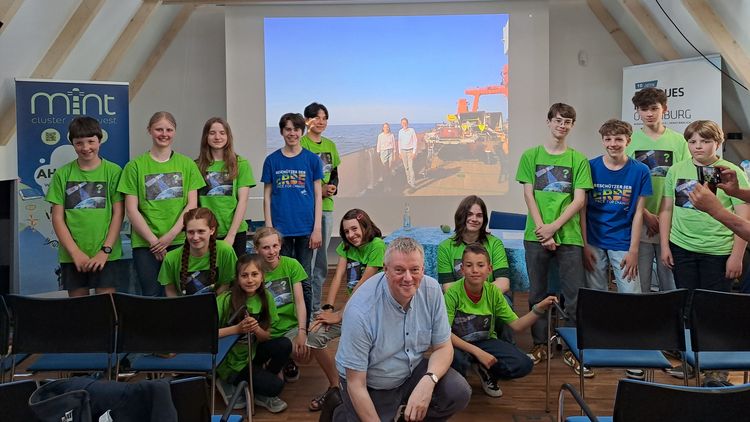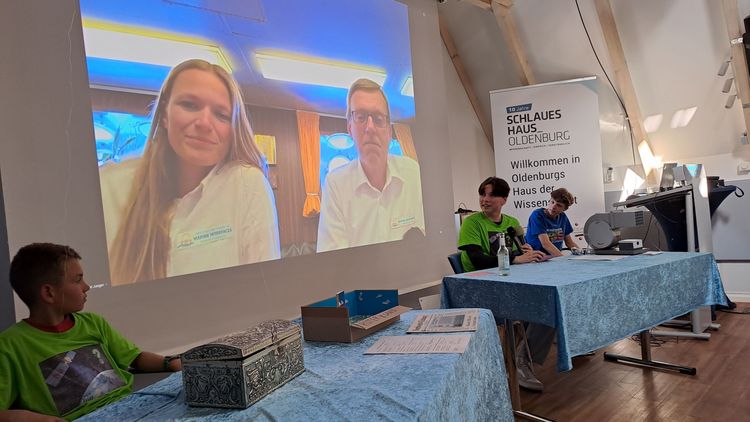Press release by Neues Gymnasium Oldenburg
The Neues Gymnasium's Science Café explores current topics in marine and climate protection and broadcasts live to the research vessel Meteor.
On June 20, 2025, after a long break, the first Junior Science Café of the “Na, Erde?” working group of the Neues Gymnasium took place at the Schlaues Haus Oldenburg after the pandemic. Under the motto “The North Sea is calling!”, nearly 20 students explored current issues in this northeastern marginal sea of the Atlantic. They were supported in their preparations by experts from the Institute for Chemistry and Biology of the Marine Environment (ICBM) in Wilhelmshaven and Bremen University of Applied Sciences. The highlight was a live link to researchers on the research vessel Meteor.
The students spent a school year working together on research and excursions to familiarize themselves with various aspects of marine research for the event, which they moderated themselves. The impact of climate change played a particularly important role. Subtopics included the island of Heligoland as a stopover point for migratory birds, the relocation of the historical protected Roter Sand lighthouse due to changes in the Wadden Sea, and a possible mobile launch site for small satellites, e.g., for Earth observation in the central North Sea. The participants presented their findings in micro-presentations and experiments.
Coral research
Jule, Linn and Ronja focused on coral research at the ICBM. Their occurrence is increasingly endangered worldwide due to environmental and climate change. Wilhelmshaven researchers Nicole Schröter and Laura Fiegel answered their questions in advance. The students' presentation at the Junior Science Café focused on researching methods for restoring damaged coral reefs on the East Tanzanian coast and the cultivation of corals in Wilhelmshaven.
Processes in the uppermost layer of the ocean
During the summer holidays of 2024, a small group from the school club and its leader Dr Bernhard Sturm visited the working group of Prof Oliver Wurl (ICBM Wilhelmshaven) on a research vessel in Bremerhaven (NWZ reported). Their research at the boundary between the sea surface and the air above is currently being continued on a research mission in the Atlantic. Lois, Finn Luca and Paul had already discussed questions about carbon dioxide with PD Dr Mariana Ribas Ribas in advance. Now they had the special opportunity to ask researcher Leonie Jaeger and Prof Wurl about their research in a live broadcast on the research vessel Meteor. Coming from the UN World Ocean Conference in Nice, the FS Meteor was just off the Strait of Gibraltar at the entrance to the Atlantic. On its international mission no. M211, evaporation effects on the sea surface in particular are being investigated. These form a piece of the puzzle in assessing the influence of the ocean on the global climate. The interview about working and living on board was received with enthusiasm by both the participants and the guests.
Science in context
The school groups illustrated their presentations with models they had built themselves. Literary texts about the coast were also incorporated into the varied evening and paintings about the sea were interpreted in an exhibition.
The tradition of science cafés continues
The science cafés organized by the Neues Gymnasium in the Schlaues Haus have been a tradition for over 10 years. Topics have included wind energy, earth observation, bird migration and geology. The first live broadcasts on a research ship and a polar station took place in 2016 and 2020 (NWZ reported). In the coming school year, the "Well, Earth?" working group will continue to focus on interesting topics related to our habitat on Earth.

![[Translate to English:]](/f/5/_processed_/3/2/csm_ICBM-Logo-transparent-_91fe1c6774.png)

